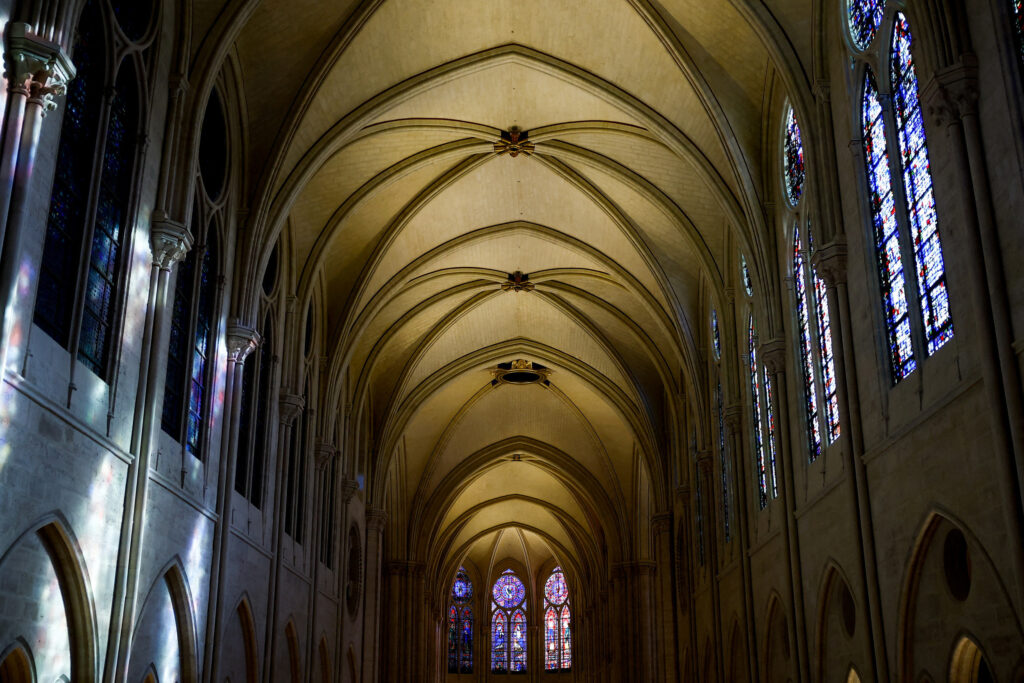Half a decade after a catastrophic blaze reduced Notre Dame Cathedral to ruins, the beloved Parisian monument stands restored in all its glory.
A first look at the completed interiors, revealed during a visit by French President Emmanuel Macron, showcases a detail-intensive transformation that blends cultural preservation with modern protections.
The Gothic masterpiece will reopen for Catholic worship on Dec. 8.
Macron praised the more than 1,000 craftspeople responsible for the building’s rehabilitation, calling it “the project of the century.”
De-Sooting Stonework
The cathedral’s nave, once darkened by soot and rubble, now radiates celestial light.
Pale Lutetian limestone, revealed after layers of grime were stripped away, gleams under the sunlight streaming through restored stained-glass windows.
The meticulous restoration process involved cleaning over 42,000 square meters of stone using innovative latex peels to strip away centuries of grime without causing damage.
Altar’s Remnants of the Tragedy
The altar preserves a striking symbol of the 2019 fire.
Nicolas Coustou’s Pietà statue, which emerged largely unscathed, bears molten lead fused into Christ’s hand——a somber reminder of the blaze.
Surrounding the altar, a carefully restored marquetry floor and the glowing Cross of Glory stand as testaments to resilience and renewal. It famously glowed eerily amid the flames during the blaze, and has been polished back to its true form.
Reviving France Most Revered Organ
One of the largest in France, the cathedral’s organ underwent a painstaking two-year restoration.
Among the largest in France, its 8,000 pipes, coated in lead dust during the fire, were disassembled, cleaned, and retuned entirely by ear. Each pipe ranged in size from that of a pen to 10 meters tall. Now, the towering wooden case gleams under the renewed clerestory windows.
The instrument was tuned by ear using the vast space of the building.
Stained Glass and Viollet-le-Duc’s Murals
Notre Dame’s 29 chapels burst with vibrant detail after decades of neglect.
Intricate murals, gilded stars, and vivid motifs——many created under 19th century architect Eugène Viollet-le-Duc——have been restored.
The Chapel of Saint Marcel, in particular, dazzles with its radiant colors, compared by some to the Sistine Chapel in Rome. Remnants of color tests from innumerable 19th-century painters were found through the polishing of each slither of stained glass, surrounded by pale Lutetian limestone.
Replacing the Scene of the Fire
The roof of the central intersection of the building, known in religious spaces as the transept crossing, was where the original spire collapsed in 2019.
It proved one of the most challenging restoration tasks. New limestone vaults replicate medieval designs with staggering precision.
Fragments of the 13th-century jubé, or choir screen, discovered during excavation, offer glimpses into the cathedral’s rich decorative past.
Equipped with Modern Fireproofing
Thermal cameras, misting systems, and reinforced water supplies ensure Notre Dame is completely protected against any future fire disasters.
The roof features medieval timber techniques faithfully recreated alongside state-of-the-art fire prevention systems.
A new spire——replicating Viollet-le-Duc’s design——rises 96 meters and honors General Jean-Louis Georgelin, who oversaw the restoration until his death in 2023.
His name is etched at its base, immortalizing his dedication to the project.
This article includes reporting from The Associated Press
Read the full article here
